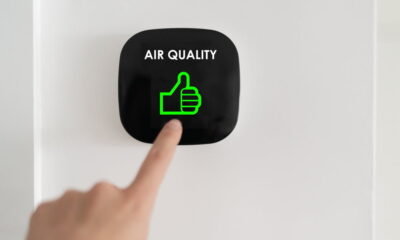

Environment
Wonderful Environmental Monitoring Tips to Keep Indoor Air Clean
The air you breathe is essential to your life. That being said, air pollution is still a global problem. Pollutants could breed and develop almost anywhere.
External elements like sunlight, rain and winds influence the air quality inside your home because they can carry pollutants with them. Maintaining a healthy indoor environment is the property owner’s responsibility for their own health and safety.
The bad news is that pollutants can be found both indoors and outdoors. It’s common knowledge that the quality of outdoor air is negatively affected by factors such as clouds of dust, car and truck exhausts, and smoke from factories. However, those could also stick to your clothing and other belongings on your person and make their way into your house or place of work. Another pollutant you may end up carrying indoors is secondhand smoke.
There are other possible causes of indoor air pollution aside from those already mentioned, including the growing amount of pollution created by the pandemic. In addition, it could cause adverse effects on human health, especially with increasing the risk for cancer and other terminal illnesses as well as allergic reactions, eye irritation, fatigue, and headaches.
For more information about this matter, you can check this great post to read regarding the role of environmental monitoring in ensuring indoor air quality.
The Importance of Clean Indoor Air
With the current coronavirus situation, it has become more crucial to maintain clean indoor air in your home and office. This way, you can prevent pollutants from harming you, your loved ones, and employees or workmates.
It’s crucial to take action against air pollutants. However, not all are aware that indoor air pollution poses a bigger risk to one’s health than outdoor air pollution. This is because you become exposed to pollutants for an extended period in an enclosed space rather than outside.
Environmental Tips for Clean Indoor Air
It’s always a good idea to maintain clean indoor air as much as possible. Failure to do so could result in the poor health of everyone within the property in the long run. To prevent that from happening, follow these tips:
1. Consult Experts
Assessing the cleanliness and purity of the air inside your home or office will require specialized tools and skills. That’s why you should enlist the help of professionals to conduct environmental monitoring since they know what to look for and how to spot potential problems, as well as provide the appropriate solutions.
2. Keep Things Clean
Even if you clean the interior of your property today, specks of dust and mold might appear in certain areas after a few days. This is why it’s essential to keep everything neat and tidy at all times.
You don’t have to do massive cleanups, though. Simple cleaning tasks such as sweeping the floor and wiping down surfaces are enough as long as you do them regularly. It’s a good idea to have a doormat to prevent more dust and dirt from getting indoors. Try to mop or vacuum as well to remove pet dander and other small pieces of dirt and to eliminate unpleasant odors.
3. Let Natural Air In
When it comes to maintaining indoor air quality, and easy method is to open the windows. If you can manage to do this every day, you may be able to reduce the concentrations of carbon dioxide and harmful substances in the air within the space. Indoor activities such as painting the walls might result in the accumulation of toxic chemicals in the enclosed area, so it’s best to let natural air in during such times. Even a few minutes of doing so would be highly beneficial.
4. Take Advantage Of Indoor Plants
Aside from adding vibrance to spaces, plants may also help address polluted indoor air. During photosynthesis, plants take in carbon dioxide and produce oxygen as a byproduct. Indoor plantscapes benefit both your health and the quality of the air around you.
5. Dispose Of Your Garbage Properly
Never forget to remove trash from the property the right way. Allowing garbage to pile up indoors could seriously affect air quality. Mold will grow on food items when left to rot, and the proper disposal of waste could be the best way to avoid it.
Your garbage may also contain chemical products that release hazardous factors, such as batteries, brake fluids, chlorine bleach, and drain cleaners. This could be dangerous when inhaled or ingested. It might be best to make sure you remove trash from indoor spaces so as not to compromise air quality.
6. Stay Away from Cigarette Smoke
Smoking is said to be detrimental to one’s health, but inhaling secondhand smoke is just as terrible. Cigarette smoke contains thousands of chemicals, which could have a grave impact on the health of both the smoker and those around them.
If possible, stay away from those who smoke, be they heavy smokers or social smokers. And don’t let anyone smoke in your home. Persuading a smoker to quit can be challenging, so it’s easier to avoid them or set boundaries for them instead.
Final Thoughts
It would be best not to overthink when it comes to getting rid of dust and other pollutants in the air. The tips mentioned here are some of the simplest ways you can monitor and maintain indoor air quality. By following them, you’ll be able to ensure that everyone inside your home or workplace can always breathe easily.


 Environment12 months ago
Environment12 months agoAre Polymer Banknotes: an Eco-Friendly Trend or a Groundswell?

 Features11 months ago
Features11 months agoEco-Friendly Cryptocurrencies: Sustainable Investment Choices

 Features12 months ago
Features12 months agoEco-Friendly Crypto Traders Must Find the Right Exchange

 Energy11 months ago
Energy11 months agoThe Growing Role of Solar Panels in Ireland’s Energy Future





























